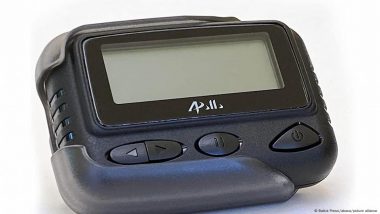Lithium-ion batteries can catch fire or explode, but in the attack on pagers in Lebanon, the devices are more likely to have been hacked.Hezbollah, an Iran-backed Shiite political party and militant group in Lebanon, has alleged Israel coordinated an attack that resulted in a near simultaneous explosion of about 5,000 pagers — small one-way communication devices — on September 17, 2024.
Independent analysts have said an attack of this scale would have to have been planned months in advance.
It's the use of pagers — a technological throwback to last century — that has caught the attention of many readers, and how these simple messaging units could be adapted to explode by remote detonation.
What is a pager?
While an entire generation has grown up surrounded by cellphones, specifically smartphones, there was a time where simple pagers were a commonplace device used by doctors and other professionals "on call" for emergencies.
The small devices use specific radio frequencies, and, in most cases, only send one-way messages to specific recipients. The recipient then has to use another device to either message or call back.
And they haven't disappeared entirely. They are considered more reliable for communication in emergency situations, for instance, such as during blackouts or natural catastrophes.
Hezbollah officials reportedly switched to pagers from cellphone and satellite networks to evade tracking by Israel. Pagers allowed Hezbollah to send short messages.
Phone networks, on the other hand, can be monitored to geolocate devices.
The AR-924 pagers identified in the Lebanon attacks were reportedly manufactured under license by Hungarian company BAC Consulting KFT, according to the product's Taiwanese licensor Apollo Gold.
BAC's chief executive has since denied being responsible for the production of the items used in the attack.
According to the specifications listed by Apollo Gold on a since-removed product webpage, the AR-924 has up to nearly three months of battery life on a single charge.
Could it have been a lithium-ion battery explosion?
It is possible that the explosions resulted from thermal runaway of small lithium-ion batteries used to operate the pagers.
While generally safe to use, incorrect storage, charging or damage to lithium-ion batteries can result in overheating.
At full charge, this can lead to battery combustion — as has been shown in numerous internet videos and news footage of cellphones, or personal mobility vehicles, such e-scooters, lighting up.
A manipulated signal or malfunction of a device equipped with a lithium-ion battery could cause the battery to explode, but footage of the attacks makes this seem unlikely.
"What we're talking about is a relatively small battery bursting into flames. We're not talking of a fatal explosion here... my intuition is telling me that it's highly unlikely [that it was caused by thermal runaway]," Paul Christensen, a professor of electrochemistry at Newcastle University told the Reuters news agency.
More likely: Hezbollah's pagers were sabotaged
While it is unclear what caused the explosions, at time of publication, the most probable explanation is sabotage at some point in the supply chain.
Lebanon's security services have told news agencies that about 5,000 of the AR-924 pagers were likely rigged with explosives before delivery.
A forensic assessment of the explosion sites would allow authorities to determine the chemistry behind the explosives.
Hezbollah has said it is conducting a "security and scientific" investigation.
While the pagers were reportedly seen to overheat and explode, Carlos Perez, director of security intelligence at cybersecurity firm TrustedSec, told the Associated Press news agency, "the battery was probably half-explosive and half-actual battery."
Other bomb disposal experts have suggested that the simple build of a pager means it has most of the components needed for a makeshift bomb already, — and that all that may have been needed was to have explosive material and a detonator added to them.
DW requested comment from several independent experts but all declined.
Edited by: Zulfikar Abbany
(The above story first appeared on LatestLY on Sep 18, 2024 08:40 PM IST. For more news and updates on politics, world, sports, entertainment and lifestyle, log on to our website latestly.com).













 Quickly
Quickly





















